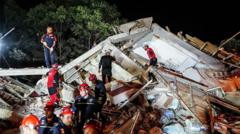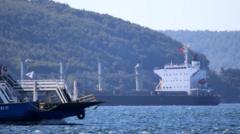Mark Lowen describes the moment he was detained by Turkish authorities just days after arriving to cover protests. Despite a generally cordial interaction at first, he was ultimately deported for allegedly being a "threat to public order." This incident underscores the ongoing suppression of press freedom in Turkey and reflects the broader unrest following the arrest of a key political figure.
BBC's Mark Lowen Shares Experience of Arrest and Deportation from Turkey

BBC's Mark Lowen Shares Experience of Arrest and Deportation from Turkey
The BBC correspondent recounts his unexpected detention and deportation while covering significant protests in Istanbul, highlighting the challenges faced by journalists in Turkey.
I had just sent my family a message saying how thrilled I was to be back in Turkey, where I once lived, expressing a sense of homecoming. Then, my hotel phone rang. "We have an urgent matter to discuss in person," said the receptionist. "Could you come down?" Upon my arrival, three plain-clothes police officers awaited me; they requested my passport and escorted me away, attempting to shield their actions from my colleagues’ cameras.
At that point, I had been in Istanbul for three days, reporting on anti-government demonstrations ignited by the recent arrest of Ekrem Imamoglu, the city's mayor. Initially, I was taken to police headquarters and held for seven hours, during which a couple of colleagues were permitted to be present, and lawyers could consult with me. The atmosphere was relatively friendly as some officers expressed their disagreement with the decision to detain me. One even greeted me with a hug, wishing me well for my eventual release.
Later, I was transferred to the foreigners' custody unit at Istanbul police. Here, the environment shifted; chain-smoking officers scrutinized me as I attempted to communicate in my limited Turkish. I underwent fingerprinting and was barred from accessing legal counsel or any outside communication. Early Thursday morning, authorities informed me that I was being deported on grounds of being a "threat to public order." When I sought clarification, they simply referred to a government decision. One officer recommended filming a statement indicating my voluntary departure for future reentry possibilities, which I declined because I suspected it would be misused by state media.
By 2:30 AM, I was transported to the airport’s foreigners' custody section. There, I faced uncomfortable conditions amidst the sounds of officers brushing their teeth, planes taking off, and the dawn prayer, making sleep elusive. Seventeen hours after my initial apprehension, I was escorted to a plane bound for London. Later that evening, following worldwide media attention on my case, a Turkish government statement cited my lack of proper accreditation as justification for the deportation—a rationale that had not been mentioned during my detention, revealing its arbitrary nature.
Throughout this ordeal, I experienced no mistreatment and was aware that BBC management and the British Consulate in Istanbul were diligently working for my release. Unfortunately, many do not enjoy a similar level of support from their governments when facing the Turkish authorities. During my prior tenure as the BBC Istanbul correspondent from 2014 to 2019, I witnessed first-hand how Turkey became the world's leading jailer of journalists. Reporters Without Borders ranks Turkey 158th out of 180 in the Press Freedom Index, highlighting persistent repression.
The unrest stemmed from Ekrem Imamoglu's arrest and has burgeoned into a broader demand for democracy in an increasingly authoritarian climate. The media's clampdown is a crucial aspect of this trend, suffocating dissent and public debate.
As protests rage, President Erdogan dismisses them as "street terrorism," fortified by favorable international relations and Turkey’s strategic significance in issues from Ukraine to Syria. The pertinent question now remains: Can the largest protests in over a decade maintain their momentum against Erdogan’s long-standing leadership, or will he continue to suppress dissent as the crowds chant for change?



















